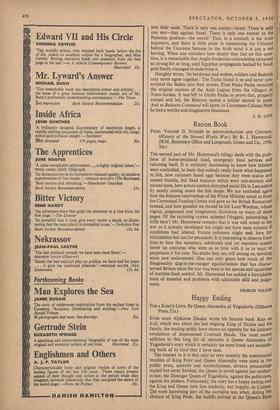Ration Book
FOOD. VOLUME II. STUDIES IN ADMINISTRATION AND CONTROL.
(History of the Second World War.) By R. J. Hammond. (H.M. Stationery Office and Longmans, Green and Co., 1956, 50s.)
THE second part of Mr. Hammond's trilogy deals with the prob- lems of home-produced food, emergency food services and rationing itself. It is curiously fascinating to know how lobsters were controlled, to learn that nobody really knew what happened to fish, how rationers hated eggs because they were scarce and caused trouble, but liked bananas which were non-existent and caused none, how potato control disrupted social life in Lancashire by nearly closing down the fish shops. We are reminded again how the humane intervention of the Prime Minister saved us from the Communal Feeding Centre and gave us the British Restaurant instead, and how grateful we should be for Lord Woolton, whose vigour, judgement and imagination illuminate so many of these pages. Of the rationing system adopted ('dogged, painstaking, a trifle slow') Mr. Hammond remarks that it was well suited to the war as it actually developed but might not have been suitable if conditions had altered. Future rationers might seek here for information but not for precedent. It is interesting to observe from time to time this necessary, admirable and yet repulsive system threw up creatures who were so in love with it as to want to perpetuate it for ever. No doubt they are still among us, devising some new enslavement. One can only guess how much of the disagreeably dog-in-the-manger egalitarianism that has charac- terised Britain since the war was bred in the queues and squabbles of wartime food control. Mr. Hammond has tackled a formidable mass of material and problems with admirable skill and judge- ment.
CHARLES WILSON


















































 Previous page
Previous page